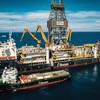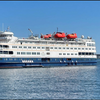APL Aims to Cut Emissions
The move coincides with an approaching deadline for a new law that goes into effect Jan 1. It requires vessels to use cleaner-burning fuel while they near California ports or while berthed. Beginning in February, the ocean carrier will also begin participating in a three-year project to test three environmentally friendly modifications on an engine aboard the 863-foot-long cargo ship APL Singapore. The ship travels monthly to Los Angeles and Oakland from ports in the Far East. Among the features being tested is a process that injects water into burned fuel to cut back the emission of nitrogen oxides and particulate matter, both contributors to smog and ozone. By some estimates, every 1 percent of water mixed with bunker fuel translates into a 1 percent reduction in nitrogen oxide emissions, the company said. The second modification involves placing side valves in the engine's cylinders to prevent fuel leaks, which can result in harmful emissions being released. The third feature centers on a lubricating system that the company said can cut cylinder oil consumption by as much as half, also reducing engine emissions. Researchers at the University of California, Riverside, will monitor the project.
The ports of Los Angeles and Long Beach, several environmental groups and county air quality control agencies contributed $1.3 million toward the cost of retrofitting APL Singapore's engine and conducting the test. In May, Maersk Line, a unit of Danish shipping giant A.P. Moller-Maersk, opted to switch its cargo ships to a cleaner burning fuel when they are in close proximity to California's coast. Source: AP















